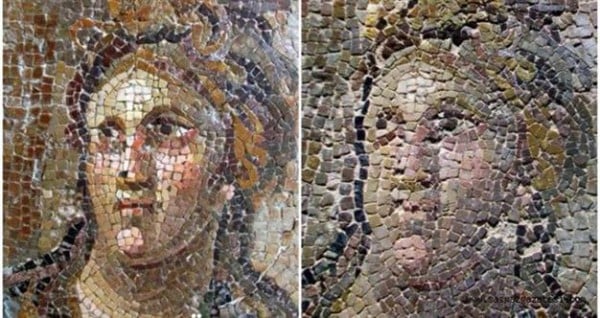
Restoration work on a series of Roman mosaics in Turkey dating from the 2nd century to the 6th century has gone horribly wrong thanks to a botched repair job at the Hatay Archaeological Museum in the southern city of Antakya, the BBC reports.
Local craftsman Mehmet Daskapan raised his concerns about the repair quality in an interview with a local paper four months ago. “Valuable pieces from the Roman period have been ruined,” he told Antakya Gazetesi at the time. “They have become caricatures of their former selves.”
Before and after photos taken by Daskapan show the extent of the damage. Some of the mosaic stones have been replaced with stones of different shapes and colors. Consequently, the facial expressions now appear awry and skewed.
According to the Turkish daily Hürriyet, at least ten artworks in the country’s second largest mosaic museum were affected.
Turkey’s Culture Ministry has ordered an investigation into the damage
Photo: Hürriyet
Following the emergence of the scandal the Turkish Culture Ministry suspended all restoration work at the museum, and Mustafa Bozdemir, deputy director of the Culture Ministry’s Heritage and Museums department, announced an investigation into the damage.
Meanwhile, Daskapan expressed concern over the extent of the scandal “The new museum currently exhibits around 65 percent of its inventory,” he said, fearing that valuable panels in the museum’s storage may also have been affected.
Turkish media is already making comparisons to an incident in Spain in 2012, in which an 83-year-old amateur painter’s attempt to ‘restore’ a historic fresco ruined the 19th century artwork (see Botched Restoration Of Jesus Fresco Miraculously Saves Spanish Town). Earlier this year, a similarly destructive project damaged Assisi’s Giotto frescoes (see Appalling Restoration Destroys Giotto Frescoes at the Basilica of Saint Francis in Assisi).